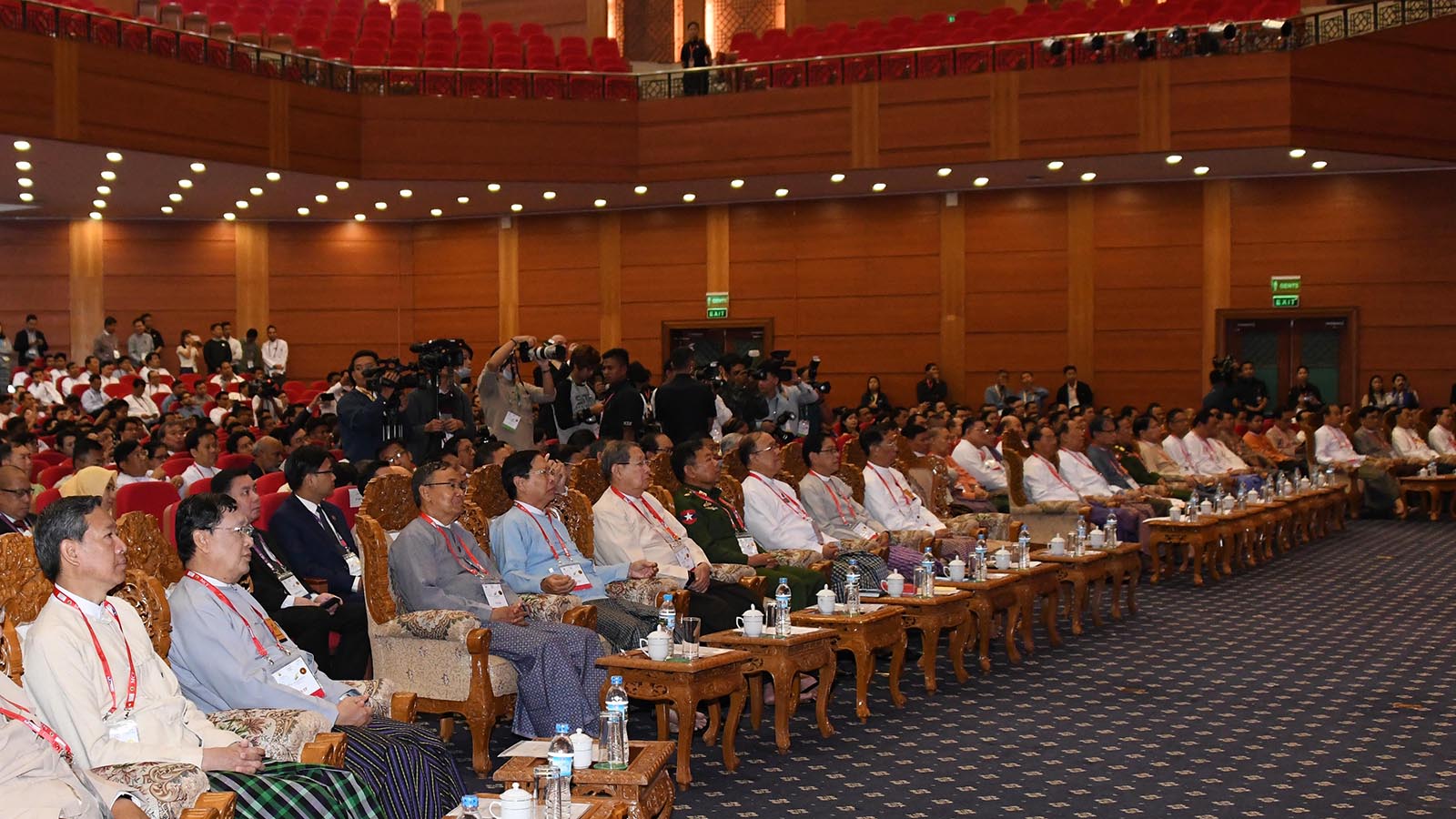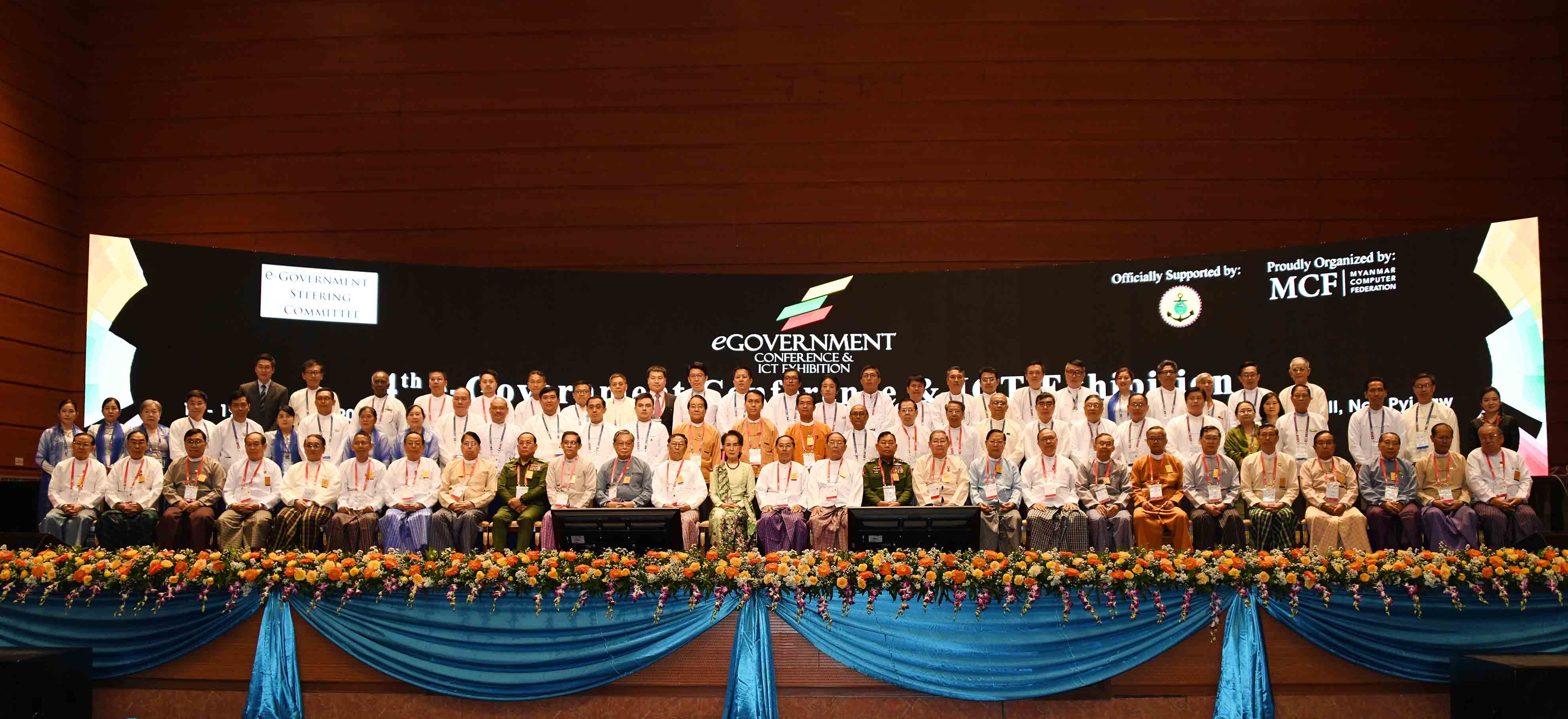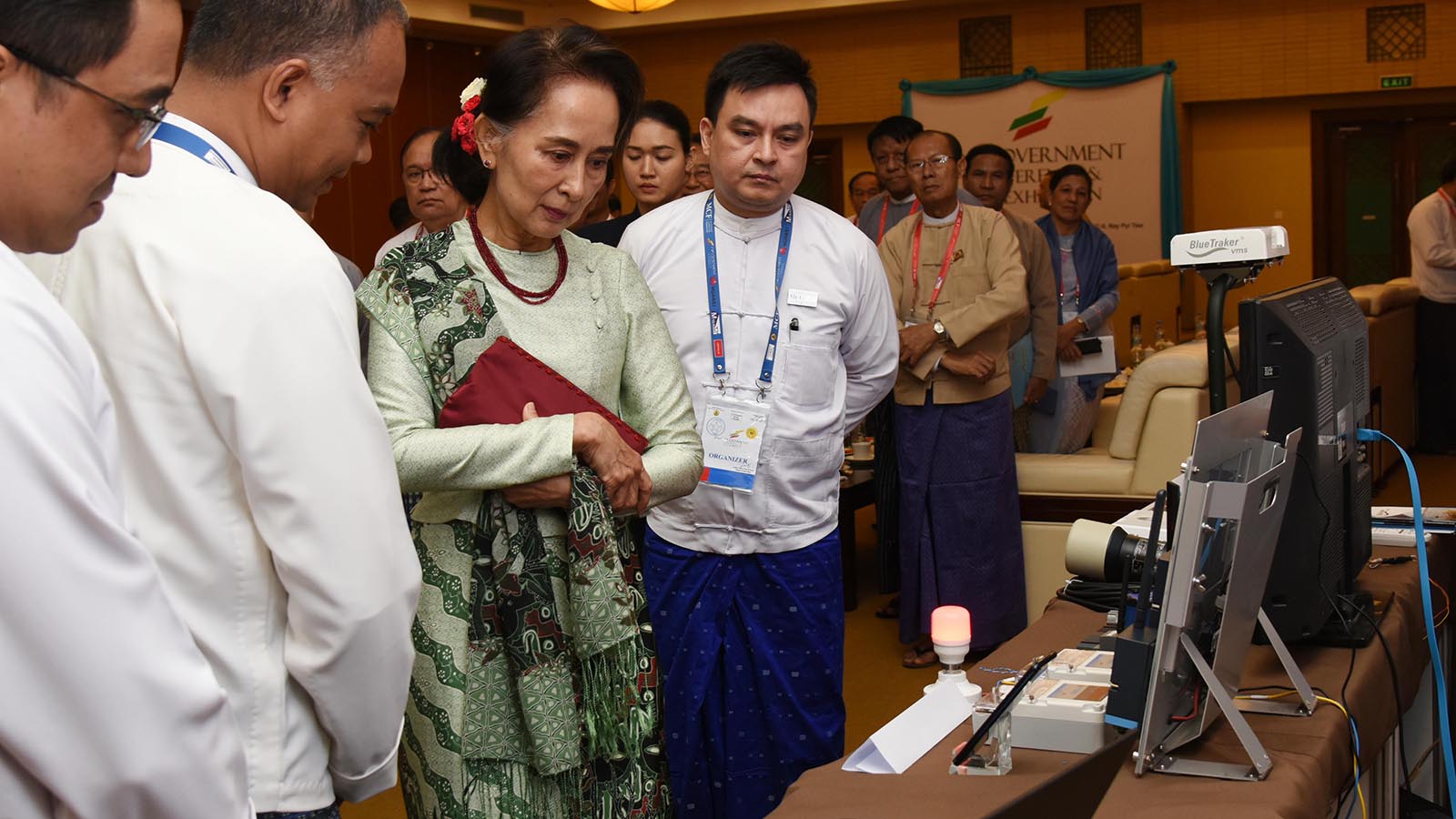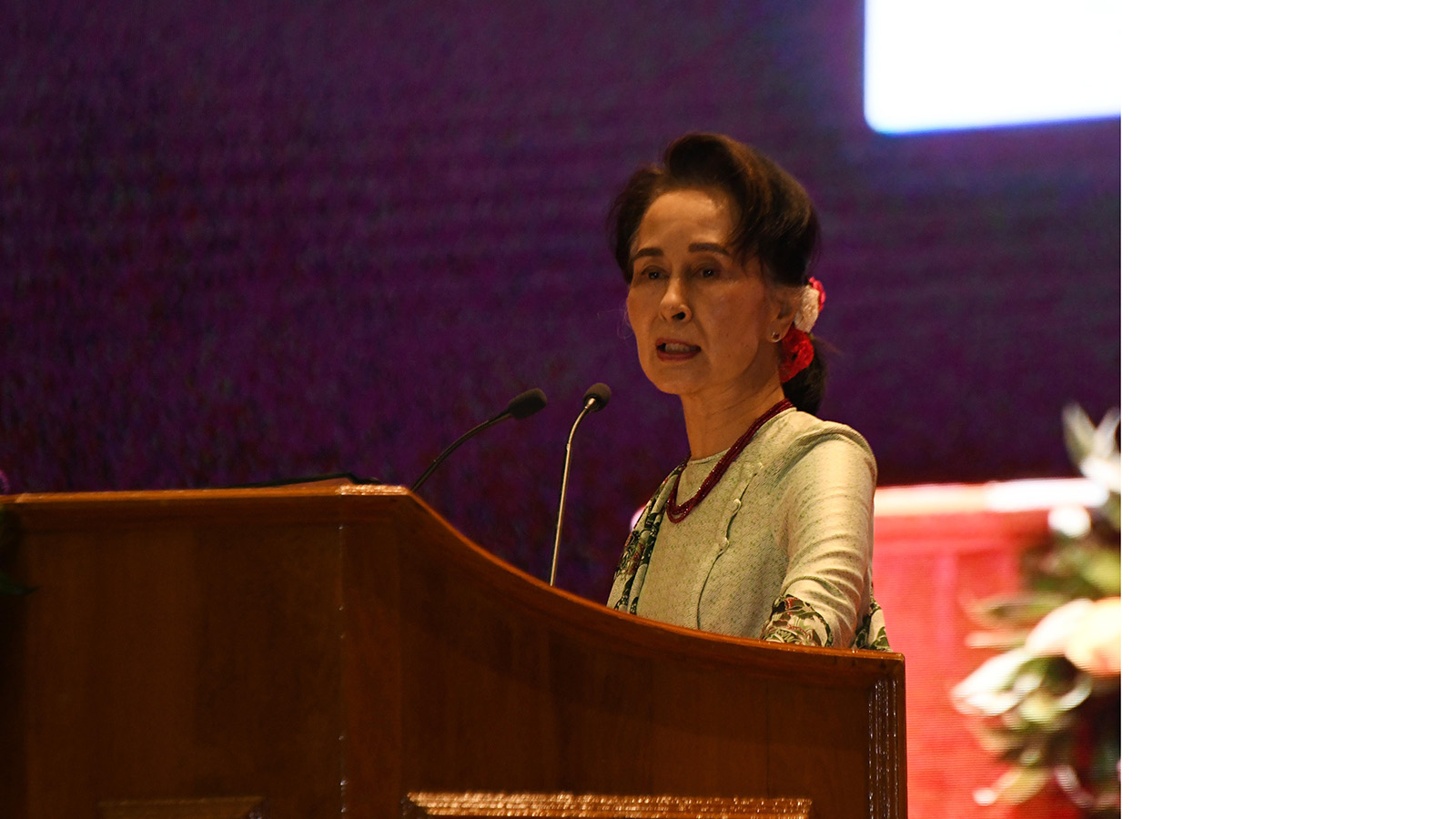State Counsellor Daw Aung San Suu Kyi, in her capacity as Patron of the e-Government Steering Committee, made a speech at the 4th e-Government Conference & ICT Exhibition held at the Myanmar International Convention Center II in Nay Pyi Taw yesterday.
After the opening ceremony, images of ancient Myanmar with an interactive experience of real world environment were presented by using augmented reality (AR) system.

After the presentation, the State Counsellor, Vice President U Myint Swe, Union Ministers U Min Thu and U Thant Sin Maung, Myanmar Computer Federation’s Patron U Thein Oo and Chairman U Min Zeya Hlaing had a photo taken with the image of Crown Prince Kanaung created in AR.
In her opening remark, the State Counsellor said, “I prefer modern technologies in Myanmar version. It means I want Myanmar people to understand and apply these technologies. Technologies should be modified into Myanmar versions gradually so that even ordinary Myanmar people can become accustomed to modern technologies.
“The implementation of e-Government is intended for many benefits, including easy and smooth activities at government agencies, effective functions, making right decisions, better services, appropriate responses to fulfill public needs and socioeconomic development of the people. The e-Government will also help closer cooperation between the government and the people, between the government and private firms, among state agencies, and between the government and civil service staff.
“The e-Government is also an enabler that can drive economic development of the country. It is also taking a crucial role in implementing sustainable development and poverty alleviation of the country.
The e-Government has many benefits. Without practicing e-Government system, no country would see development. The United Nations has set an indicator to measure development of a country in relations with the e-Government system, based on the three indicators in online services, telecommunications, infrastructural development and human resource development.

“Out of 193 global countries, Myanmar’s e-Government index stood at 169 in 2016, and it jumped up to 157 in 2018 thanks to improvements in online services and telecommunication infrastructure. However, Myanmar’s index is still under the average rank of ASEAN member countries. It shows that we need to try more tremendously.
“Although Myanmar has experienced a certain degree of increases in some sectors such as education, the country has not overtaken other ASEAN countries. Instead, a slight decrease has been noticed. It showed that our neighbouring countries have moving forward at a faster pace, and that we need faster development. It is expected the e-Government could help in this movement.
“It is also important to ensure the coverage of e-Government services to be fair, with mobile and internet communications even in remote and far-flung areas.
“The journey for e-Government is very long. For successful accomplishment of this journey, vision and leadership of successive State leaders play a crucial role. Relevant committees have been formed to implement these tasks, with the cooperation of the private sector such as the Myanmar Computer Federation and universities.
“Required infrastructures have been set up and a network has been established for linking among the ministries. Plans are underway to build a national data centre to safely store information of these ministries and to provide efficient services. Some laws concerned with the e-Government have been enacted and laws for cybercrimes and data securities will be promulgated. While State/Region governments are practicing e-Government system, the institutes of civil service and human resource development sub-committee is providing ICT training courses at the government agencies. The Ministry of Transport and Communications is conducting specialized skill trainings. The government agencies need to align its processes with implementations of e-Government system. Without making appropriate reforms, successful results will not turn out in the e-Government scheme.
“Digital transformation is a system of using digital technologies in our society for speedy completions of our works. Smart phones are used for communications such as exchanging information and business dealings. These gadgets have become a de facto digital platform. And that the e-Government activities need to be moved to digital platform.
“User authentication is required in using mobile SIM cards as persons who could not identify themselves and who are committing acts of sabotage and cybercrimes are spreading false news, hate speech and cybercrimes by taking advantage of weaknesses in SIM card registration processes. Rules and regulations are being developed to handle these problems. And that citizens with responsible and accountable attitudes should be cooperating in the SIM card registration process in supporting peace, stability and development of the country.
“It is not required to worry about these rules if someone did not commit any offensive act. If someone is using a SIM card secretively, it is generally assumed that such persons are suspected of committing some immoral acts. And that ordinary people are urged to use mobile phones with registered SIM cards.
“The Government will continue its implementation work on the “Open Data System” for the public to know the data and information that will lead to their benefits. Necessary preparations are being made to issue the “Certification Authority – CA, digital signature for online users to identify themselves. Furthermore, plans are underway to formulate the “Unique ID” for the identification and registration of those who are residing in Myanmar by using information technologies. With the accomplishment of the systems that I mentioned earlier, the pre-requisites of the e-Government process – Verification, Identification and Authentication – will be fast, accurate and secured.
“Today the world order directs towards the fourth industrial revolution. Data and information can be automatically extracted and analyzed from the source like “Big Data” via various sensor networks. If the technological advantages like ‘Smart Factory”, “Smart Car”, “Smart Healthcare”, “Smart Farming”, and “Smart City” cannot be followed through, we will surely be left behind.
“We have certain capabilities. Mandalay is now commonly known as a “Smart City”. If we try hard we can follow through. However, we need to quicken our development programme and try harder than other countries.
“Digital transformation is applied in the “Industry 4.0” implementation. Information technologies are being used in the beginning and the finish line of the whole production process. So, necessary preparatory measures should be carried out to face the IR 4.0 (Industrial Revolution 4.0). We need to accelerate and strengthen our efforts to transform the Government functions into e-Government through the application of information and communication technologies.
We need collaboration to find out ways and means. We are hopeful this e-Government conference will come out with good results.
“We need to consider the good advice and suggestions that will be suitable for our country. We don’t need to do in line with what other countries do for themselves. What we’re doing might not be good enough. We need to emphasize on the essential requirements for our country in order to try hard towards much faster development.
“This e-Government Conference and ICT Exhibition is important for the e-Government implementation work in Myanmar. It is a well-planned event that we can view the e-Government systems and technologies, exhibited by the ICT booths. Special thanks are given to the e-Government Steering Committee, the Ministry of Transport and Communications and the Myanmar Computer Federation.
“Everyone should understand the goals and objectives of the e-Government and dedicate to work for the successful accomplishment of the e-Government systems in Myanmar. We will fail unless we have firm dedication. I mean all-inclusive of the civil service personnel at State-, regions/states-, districts-, townships-, and villages-levels, the economic businesses, the associations and organizations, the intelligentsias and citizens. All need to make collective efforts,” she concluded.
The meeting was also attended by Chairman of e-Government Steering Committee and Vice President U Myint Swe, Chairman of Constitutional Tribunal U Myo Nyunt, Chairman of Union Election Commission U Hla Thein, Vice Chairpersons of the Committee Union Minister U Min Thu, and Union Minister U Thant Sin Maung, Union Ministers, Union Auditor-General, Chairman of Union Civil Service Board, Chairman of Nay Pyi Taw Council, Governor of Central Bank of Myanmar, Chairman of Anti-Corruption Commission, Chief Ministers of State/Region governments, Chairpersons of Hluttaw Affairs Committees, Deputy Ministers, State/Region ministers, Permanent Secretaries, departmental heads and officials, the patrons, chairpersons, vice chairpersons, CEC members of Myanmar Computer Federation, the Union of Myanmar Federation of Chambers of Commerce and Industry and Federation of Myanmar Engineering Society, representatives of technology companies, technicians and the invited guests. Next, the State Counsellor, the Vice President and guests posed for documentary photos with the patrons, the chairperson, the vice chairpersons and the executive members of the Myanmar Computer Federation, the chairpersons of the Union of Myanmar Federation of Chambers of Commerce and Industry and the Federation of Myanmar Engineering Societies and officials.

Then, the State Counsellor and the Vice President were briefed on the status of implementation work by President U Min Zeya Hlaing of the Myanmar Computer Federation; and on the Fourth Industrial Revolution versus Future Myanmar by Federation Vice President Dr Tun Thura Thet.
Afterwards, the State Counsellor, the Vice President and the dignitaries took a tour of the exhibition booths displayed by the ministries, the federations and the technology companies concerned.
The second session of the conference was then followed by Union Minister U Thant Sin Maung of the Ministry of Transport and Communications explaining the ongoing implementation work undertaken by the e-Government Steering Committee, and U Min Zeya Hlaing of the Myanmar Computer Federation on the work done by the federation.
The Memoranda of Understanding (MOUs) namely “Technology Cooperation for Union Development” were signed by Chairman U Min Zeya Hlaing of the Myanmar Computer Federation and President U Zaw Min Win of the Union of Myanmar Federation of Chambers of Commerce and Industry, and Chairman U Aung Myint of the Federation of Myanmar Engineering Societies and President U Min Zeya Hlaing of the Myanmar Computer Federation respectively. The talks on “Towards Digital Government” and a round of discussions on “Myanmar’s Fourth Industrial Revolution versus Future Myanmar” were then held. The e-Government Conference will continue till the 19 February 2020. —MNA
(Translated by Aung Khin, Aungthu Ya)


